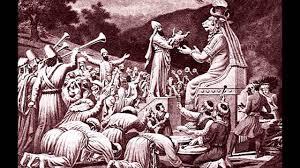The God of Brazil is Moloch, who devours his children
- Opinión

It is said that God is Brazilian. This is not the God of tenderness or the humble, but the Moloch of the Canaanite and Phoenicians, who devours his children. We are one of the most unequal, unjust and violent countries in the world. Theologically, we live in a situation of social and structural sin, contrary to God's design. It is enough to consider what happened in the jails of Manaus, Rondonia and Roraima. It’s pure barbarity: fury that beheads, pierces eyes and destroys the heart.
There is not just violence in Brazil. We are grounded in violent socio-historical structures, based on the genocide of the Indigenous, humiliating colonialism and inhumane slavery. And these structures cannot be overcome without first overcoming this dreadful tradition.
How to do that? It is a challenge that demands a colossal transformation of our social relationships. Is this still possible or are we condemned to be a pariah country? I see it as possible, on condition of following, among other things, these two paths developed by the grassroots: the creation of a people, beginning with the social movements, and the installation of a social-democracy, grounded in the people.
The creation of a people: those who colonized us did not come to create a nation, but to found a commercial enterprise, become wealthy fast, make themselves hidalgos (children of something...), return to Portugal and enjoy themselves with their accumulated wealth.
They first conquered the Native peoples and then they brought Black slaves from Africa to do the labor. A human mass was created, dominated, humiliated, and despised by the elites, even in our times.
Apart from some earlier revolts, there was a historic change beginning in the 1930s. Unions and the most varied social movements emerged. At the heart of the movements were conscious social actors, critics, with a will to modify the social reality and create the seeds of a more participatory and democratic society.
The development of these associations generated the Brazilian popular movement. It is turning the mass into an organized people, one that did not exist before as a people, but that now is being born. It forces the political society to listen, and negotiate, and in this way to diminish the levels of structural violence.
The creation of a social-democracy with a popular base: we have a representative democracy, but one of very low intensity, filled with political vices and corruption, where the representatives are generally elected by the large enterprises, whose interests they represent.
But as a counterweight, due to popular organizing, there have already been created popular political parties and segments of progressive parties, including the liberal-bourgeois, or, traditionally from the left, parties that promote profound reforms in society and seek to conquer State power, be it at the municipal, state or federal level.
This participatory democracy is fundamentally seated on these four legs, like a table:
- participation, the broadest possible, of everybody, upwards from the base, in such a way that everyone may consider himself or herself an active citizen;
- equality, resulting from the degree of participation. Equality gives the citizens greater opportunities to live better. In the face of the existing inequalities, social solidarity must be strengthened;
- respect for differences of every type; that is why a democratic society must be pluralist, multi-ethnic, respectful of all religions and with various forms of communal resources.
- the valuing of human subjectivity; the human being is not only a social actor, the human being is a person, with his/her own world vision, who cultivates values of cooperation and solidarity that humanize institutions and social structures.
Moreover, this table is on a base, without which it cannot stand: a new relationship with Nature and with the Earth, our Common Home, as Pope Francis emphasizes in his ecological encyclical letter. In other words, this democracy must incorporate the ecological moment, based on a different paradigm. The current paradigm, centered on power and domination, in function of unlimited accumulation, has encountered an insuperable barrier: the limits of the Earth and of her renewable and non-renewable goods and services. A limited Earth cannot support unlimited growth. By surpassing these limits, we are now witnessing global warming and the extreme events experienced in this year of 2017, with snow falling in almost all of Europe: which has not happened for one hundred years.
The ever-increasing consciousness of these limits, forces us to think of a new paradigm of production, consumption, and sharing of the scarce resources among humans and also with the community of life (the flora and fauna that are also created by the Earth and need their nutrients). Here is where the values enter of caring, co-responsibility and solidarity of all with all, without which the project will never prosper.
From these premises, we can hope to overcome our violent social structures.
The alternative is to toy with change, so that nothing actually changes.
01-17-2017
- Leonardo Boff, Theologian-Philosopher, Earthcharter Commission
(Free translation from the Spanish sent by Melina Alfaro, alfaro_melina@yahoo.com.ar. Done at REFUGIO DEL RIO GRANDE, Texas, EE.UU. )
Del mismo autor
- O risco da destruição de nosso futuro 05/04/2022
- Reality can be worse than we think 15/02/2022
- ¿Hay maneras de evitar el fin del mundo? 11/02/2022
- Há maneiras de evitar o fim do mundo? 08/02/2022
- The future of human life on Earth depends on us 17/01/2022
- El futuro de la vida depende de nosotros 17/01/2022
- A humanidade na encruzilhada: a sepultura ou… 14/01/2022
- “The iron cage” of Capital 04/01/2022
- Ante el futuro, desencanto o esperanzar 04/01/2022
- Desencanto face ao futuro e o esperançar 03/01/2022
